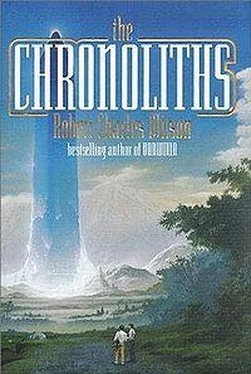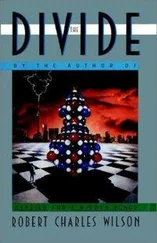But the most recognizable Chronoliths are the monsters, the city-wreckers. The Kuin of Bangkok, straddling the rude brown water of the Chao Phrya; the Robed Kuin of Bombay; the stern and patriarchal Kuin of Jerusalem, seeming to embrace the world’s faiths even as religious relics lie scattered at his feet.
The Kuin of Wyoming surpassed all these. Sue had been right about the significance of this monument. It was the first American Chronolith, a proclamation of victory in the heartland of a major Western power, and if its manifestation in this rural wasteland was an act of deference toward the great American cities, the symbolism remained both brazen and unmistakable.
The cold shock eased at last. We stirred out of our torpor and woke to a dawning awareness of what had happened here and what we had failed to achieve.
Hitch, characteristically, gave first thought to the practical business of staying alive. “Rouse up,” he said hoarsely. “We need to be away from here before the Kuinists come looking for us, which probably won’t be long. We need to avoid the main road, too.”
Sue hesitated, regarding the battery-powered gear lining the wall of the bunker. The instrumentation blinked incoherently, starved for input.
“You, too,” Hitch said.
“This could be important,” she said. “Some of these numbers pegged awfully high.”
“Fuck the numbers.” He ushered us stumbling to the door.
Sue wailed at the sight of the Chronolith dominating the sky.
Ray came up behind her; I followed Hitch. One of our few remaining engineers, a gray-haired man named MacGruder, stepped out and promptly fell to his knees in an act of pure if involuntary worship.
The Kuin was — well, it beggars description.
It was immense and it was frankly beautiful. It towered above the nearest large landmark, the stony bluff where the saboteurs had parked themselves. Of the tau core and its attendant structures there was, of course, no sign. The skin of ice on the Chronolith was already dropping away — there had not been much moisture in the ambient air — and the monument’s details were unobscured save by the mists that sublimated from its surface. Wreathed in its own cloud, it was majestic, immense, tall as a mountain. From this angle the expression on the Kuin’s face was oblique, but it suggested a smug complacency, the untroubled confidence of an assured conqueror.
Ice crystals melted and fell around us as a fine cold mist. The wind shifted erratically, now warm, now cool.
The main body of Kuinists had gathered to the south of the site. Many of them must have been disabled by the thermal shock, but the perimeter fence there veered a good couple of miles from the touchdown site, and judging by the renewed crackle of gunfire they were still lively enough to keep the Uniforces engaged. Soldiers closer to us had survived in their thermal gear but seemed disoriented and uncertain — their communications equipment had shut down and they were rallying to the flattened ruins of the east gate.
Of the militiamen who had disabled the tau core there was no sign.
Ray told the remaining engineers and technicians who shuffled out of the bunker to stick with the Uniforces. The journalists in the lee of the bunker must have had a different thought: They barreled past the fallen fence in their bulletproof vans. They had acquired and were no doubt already broadcasting this stunning image, the vast new Kuin of Wyoming. Our failure was an established fact.
Ray said, “Help me get Sue to the van.”
Sue had stopped weeping but was staring fixedly at the Chronolith. Ray stood next to her, supporting her. She whispered, “This isn’t right…”
“Of course it isn’t right. Come on, Sue. We need to get away.”
She shook off Ray’s hand. “No, I mean it’s not right . The numbers pegged high. I need a sextant. And a map. There’s a topographical map in the van, but — Hitch !”
Hitch turned back.
“I need a sextant! Ask one of the engineers!”
“The fuck?” Hitch said.
“A sextant !”
Hitch told Ray to get the van started while he hurried back with a digital sextant and a tripod from the survey vehicle. Sue set up the instrument despite the gusting wind and scribbled numbers into her notebook. Ray said, gently but firmly, “I don’t think it matters anymore.”
“What?”
“Taking measurements.”
“I’m not doing this,” she said briskly, “for fun ,” but when she tried to fold up the tripod she fainted into Ray’s arms, and we carried her to the van.
I picked her notebook out of the icy mud.
Hitch drove while Ray and I got a cushion under Sue’s head and a blanket over her body. The Uniforces people tried to flag us down. A guard with a rifle and a nervous expression leaned in the window and glared at Hitch. “Sir, I can’t guarantee your safety—”
“Yeah,” he said, “I know,” and gunned the engine.
We would be safer — Sue would be safer — well away from here. Hitch cut across the flatlands on one of the local roads. These were dirt trails that dead-ended, most of them, at failed ranches or dry cattle tanks. Not an especially promising escape route. But Hitch had always preferred back roads.
Despite the elaborate coldproofing, our engine had sustained damage in the thermal shock. The van was kicking and dying by nightfall, when we came within sight of a cinderblock shed with a crude tin roof. We stopped here, not because the building was in any way inviting — many seasons of rain had come through the empty windows; generations of field mice had built and abandoned nests inside — but because it would serve to disguise our presence and would shelter the van from easy view. We had at least put a few miles behind us.
And with nothing left to do, the sun setting beyond the now-distant but still dominating figure of Kuin and a brisk wind combing the wild grass, we huddled in the vehicle and tried to sleep. We didn’t have to try very hard. We were all exhausted. Even Sue slept, though she had revived quickly from her faint and had been alert enough on the drive east.
She slept through the night and was up at dawn.
Come morning, Hitch opened the van’s engine compartment and ran the resident diagnostics. Ray Mosely blinked at the noise but then rolled back to sleep.
I woke hungry, remained hungry (we had only emergency rations), and walked past the paint-scabbed wall of the shed to the place on the grassland where Sue had once again unfolded our tripod and sextant.
The surveyor’s tool was aimed at the distant Chronolith. Sue had opened a top map and laid it at her feet, the corners weighted with rocks. A brisk wind tousled her coiled hair. Her clothes were dirty and her enormous eyeglasses smudged; but, incredibly, she managed to smile when she noticed me.
“Morning, Scotty,” she said.
The Chronolith was an icy pillar silhouetted against the haze-blue horizon. It drew the eye the way any incongruous or shocking thing does. The Kuin of Wyoming gazed eastward from his pedestal, almost directly at us.
Aimed at us, I thought, like an arrow.
I said, trying to restrain the irony, “Are you learning anything?”
“A lot.” She faced me. Her smile was peculiar. Happy-sad. Her eyes were wide and wet. “Too much. Way too much.”
“Sue—”
“No, don’t say anything practical. May I ask you a question?”
I shrugged.
“If you were packing for a trip to the future, Scotty, what would you take?”
“What would I take ? I don’t know. What would you take?”
“I would take… a secret. Can you keep a secret?”
It was an unsettling question. It was something my mother used to ask me when she began to bend into insanity. She would hover over me like a malign shadow and say, “Can you keep a secret, Scotty?”
Читать дальше












